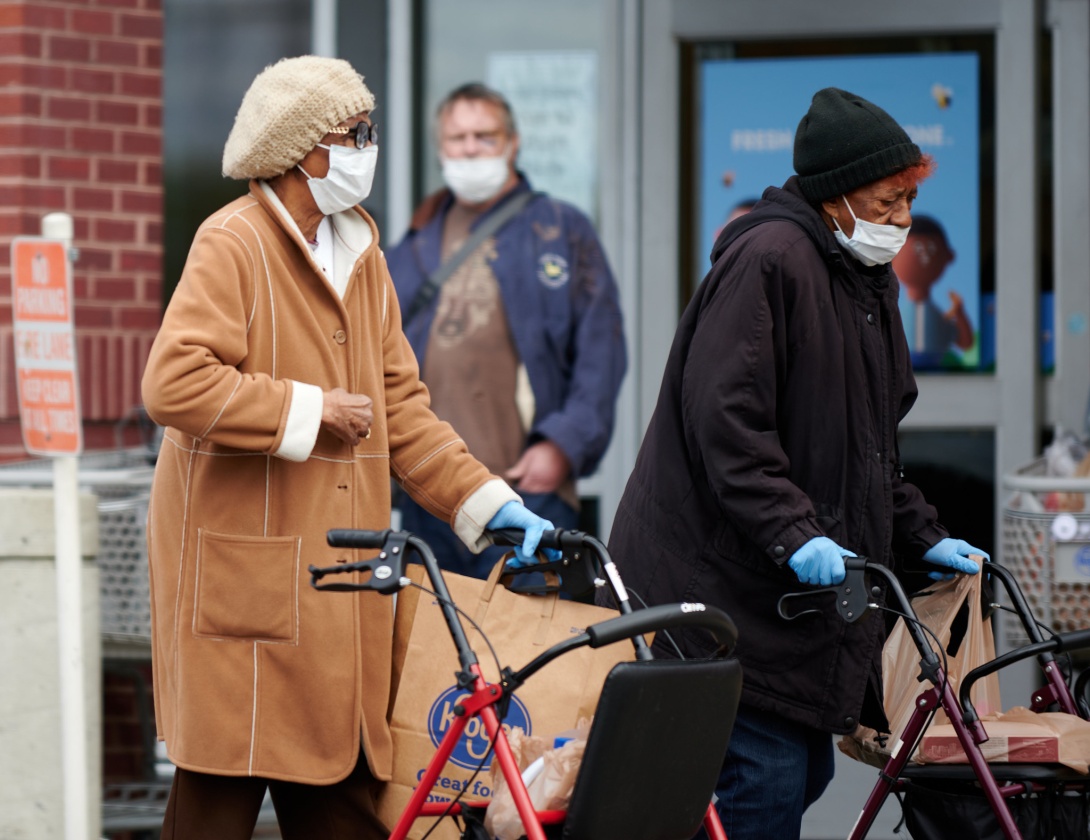Southern states start reopening as black communities bear COVID-19's brunt

Data shows that African Americans nationwide are being disproportionately impacted by COVID-19. With Southern states starting to reopen amid the ongoing pandemic, social justice groups are concerned that vulnerable communities are being put at risk. (Photo by Ronnie Pitman via Flickr.)
Most state data so far shows significant racial disparities in deaths from COVID-19 across the country, with black Americans overrepresented and whites underrepresented relative to their share of the overall population, according to Facing South's analysis of state data compiled by the Kaiser Family Foundation (KFF).
In the South*, the region that's home to most black Americans, states have begun partially reopening some nonessential businesses. That's leading to concerns among social justice groups that Southerners — and especially black Southerners — could be even more severely impacted by COVID-19.
Texas, Georgia, and Florida — the three states with the largest numbers of black residents — are allowing restaurants to open under limited operations and easing social distancing measures. Most of the South is taking a different approach than other regions that are still largely shut down.
It's possible that states could reopen and see infection numbers drop, as data scientist Youyang Gu, whose coronavirus work is cited by the CDC, told CNN — but results won't be measurable for weeks. Flare-ups could also happen if states rush reopening and people let down their guard. An outbreak in the South could place vulnerable communities at risk and widen already-existing racial disparities in COVID-19 deaths.
In Florida, for example, white residents make up 53% of the state population and 49% of its COVID-19 deaths, while black residents are 15% of the population but 21% of COVID-19 deaths, according to state data compiled by KFF and updated as of April 24. In Georgia, black residents account for 31% of the state population but 52% of COVID-19 deaths.
As of April 24, KFF data from Texas showed no such racial disparity, but since then the numbers have shifted. As of May 1, black Texas residents account for 13.1% of COVID-19 deaths, according to state health department data, but 12.8% of the state's population.
It's not just the South seeing these racial disparities in COVID-19. Across the country, black Americans are overrepresented in deaths from the disease relative to their population and are dying of COVID-19 at higher rates than other race groups. An analysis by the Washington Post released early last month showed majority-black counties had three times the rate of infections as did their majority-white counterparts.
Understanding the disparities
More research is needed to fully understand the racial disparities we're seeing with COVID-19, according to Michael Kramer, associate professor of epidemiology at Emory University in Atlanta. Yet "that doesn't mean we don't have some pretty reasonable starting points" that can help make sense of what's happening, he told Facing South via email.
For starters, there are longstanding racial disparities in underlying health statuses like hypertension, diabetes, lung disease, and obesity, Kramer says. "In other words, long before coronavirus came along, Black communities experienced excess risk for chronic diseases and their risk factors. So those historical patterns now meet up with a virus that penalizes baseline health," says Kramer.
In the New York City area, the epicenter of the U.S. coronavirus outbreak, hypertension, diabetes, and obesity were the most common underlying health conditions among 5,700 hospitalized COVID-19 patients between March 1 and April 4, according to a research paper published in the Journal of the American Medical Association. As of April 27, New York City's black residents were dying of COVID-19 at higher rates than Hispanics, whites or Asians, based on the city's tally of probable and confirmed COVID-19 deaths.
"For some, this is the end of the story," Kramer says. "We know there are black-white disparities in underlying health, and therefore it is not surprising that there are black-white disparities in COVID-related health problems and deaths," he adds. "I don't disagree with the preceding statement; I just think it fails to go to the next logical question, which is why are there disparities in chronic disease by race (or by ethnicity, class, geography)?"
The Atlanta-based U.S. Centers for Disease Control and Prevention (CDC) says "existing health disparities, such as poorer underlying health and barriers to getting health care, might make members of many racial and ethnic minority groups especially vulnerable in public health emergencies like outbreaks of COVID-19." Compared to whites, for example, black Americans have higher death rates and higher prevalence rates of chronic conditions, and they are nearly twice as likely to be uninsured. Black people of all ages are also more likely than whites to report not being able to see a doctor due to cost, according to the CDC.
Kramer points out that research conducted over several decades has documented racial and socioeconomic differences in access to health care and "historical and structural inequalities in life chances and opportunities (on average) by race/ethnicity, class, and geography."
"So all together this would suggest to me that what we see with COVID-19 is not a surprise," he adds. "It is simply shining a light on social inequalities that have existed for decades (centuries), that persist today, that affect health across time, and essentially serve as dry tinder for a virus like the coronavirus."
Some state leaders in the South are taking action to better understand and address health disparities among communities impacted by the new coronavirus. Last month, Louisiana Gov. John Bel Edwards, the Deep South's only Democratic governor, announced the creation of the Louisiana COVID-19 Health Equity Task Force. The group, comprised of relevant departments at universities across the state, will look at how health inequities are affecting communities hit hardest by the new coronavirus. Louisiana is under a stay-at-home order that ends on May 15.
"We know that right now 70% of our deaths in Louisiana from coronavirus are African Americans," Edwards said in an April press release. African Americans make up 32.7% of the state's population. "This is a disturbing trend and one that deserves our attention, which is why we are engaging a group of leaders right now while the crisis is still ongoing."
'Rescind it'
Meanwhile, a coalition of social justice groups including Black Voters Matter, the Highlander Research and Education Center in Tennessee, Southern Rural Black Women's Initiative, and the Southern Movement Assembly are petitioning Govs. Kay Ivey of Alabama, Ron DeSantis of Florida, Brian Kemp of Georgia, Tate Reeves of Mississippi, Roy Cooper of North Carolina, Henry McMaster of South Carolina, Bill Lee of Tennessee, and Greg Abbott of Texas to refrain from reopening their states. The petition says that doing so without first taking certain actions "is irresponsible and a death sentence" for many.
As of May 6, all of these Southern states had partially reopened except North Carolina, which will begin the first part of a three-phase reopening plan on May 8. The coalition is also asking for more state data on COVID-19 and race.
"We're not asking them to slow down the reopening. We're like, 'Rescind it, because it's dangerous,'" Ash-Lee Woodard Henderson, Highlander's co-executive director, told Facing South. Addressing the governors, she added, "Blood will literally be on your hands if our families are put in a position of having to choose between taking care economically of our families or keeping our families from contracting the virus."
* Facing South defines the region as including Alabama, Arkansas, Florida, Georgia, Kentucky, Louisiana, Mississippi, North Carolina, South Carolina, Tennessee, Texas, Virginia, and West Virginia.
Tags
Rolando Zenteno
Rolando Zenteno is the inaugural recipient of the Julian Bond Fellowship with Facing South.
